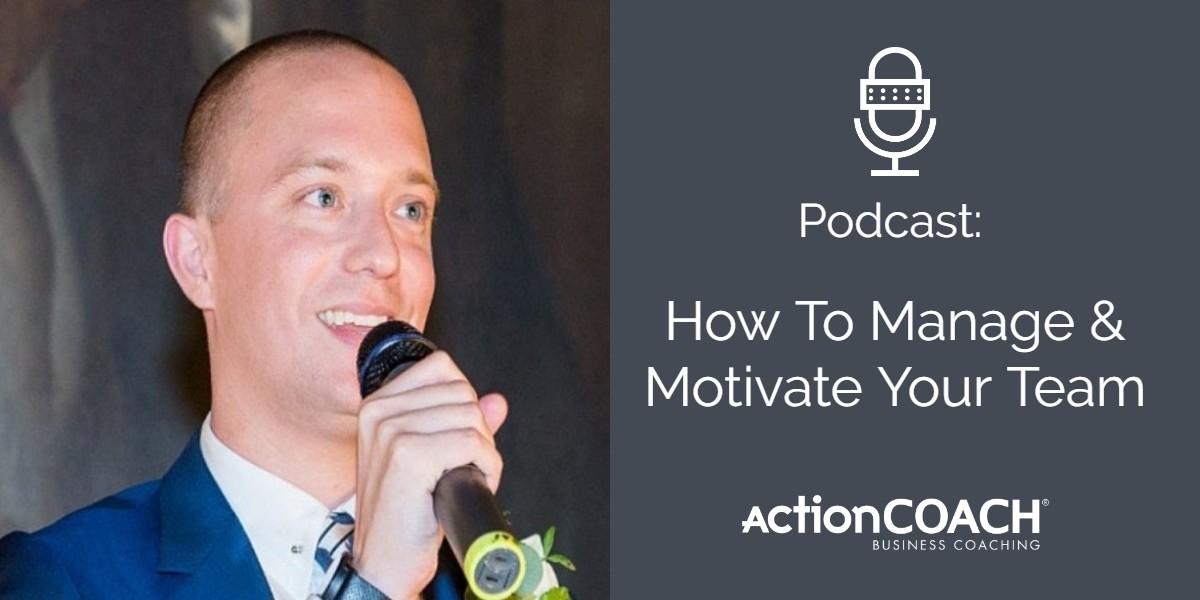Podcast: How To Manage & Motivate Your Team
Podcast: Play in new window | Download
In episode 6 we talk to our very own Dan Crompton – the newest coach to join the team here at The Business Growth Agency.
Dan worked at ITV for 7 years, where he co-managed the partnerships team responsible for £130m annually. Drawing on his experience there plus many years of coaching experience he shares his practical strategies for managing and motivating teams.
Click the play button above to listen.
Episode highlights
1:24 Dan’s #1 tip for being a great manager
3:14 As a manager can you also be close friends with your team?
4:20 What strategies has Dan used to successfully motivate his team?
6:04 The keys to running effective team meetings and 1-on-1s
8:58 Dan’s thoughts on goal setting, KPIs and accountability
Links
Simon Sinek’s Start With Why: Book and video summary
Dan Pink’s Drive: Book and video summary
Kenneth Blanchard’s The One Minute Manager: Book and our summary
Stephen Covey’s 7 Habits of Highly Effective People book
Transcript
Bryn: Hello and welcome to The Business Growth Agency Podcast where we bring you short, actionable guides that help you and your business to grow. In episode number 6 we speak to Dan Crompton about practical people management skills.
Dan is a business coach and is our newest hire. He blew us away when he came to interview. Before joining us co-manager of the partnerships team at ITV where he was responsible for over £130M annually. He’s also coached people from companies like Facebook, ITV and HSBC – what I’m hinting at is: he knows a thing or two about the art and science of managing people.
Dan: As a manager you will be able to do the job better than your team. That’s why you’re the boss. So you’ve got to get out of the mindset of “Oh well look… I can do it right, I can do it better, I can do it the best!” Of course you can.
Bryn: Here’s Margarida and Dan Crompton
Margarida: What, for you, makes someone a great manager?
Dan: I think the biggest tip for being a great manager – it’s a bit counter-intuitive – is to never answer any questions.
Margarida: What do you mean?
Dan: So if you’ve got a big team, you’ll be getting questions all the time, people coming to you with their problems or “what shall I do in this situation?” and I think the go-to, because you’re the manager and you know more than they do, is just to give them the answer.
What I’ve found, both in managers I’ve had and in managing teams myself, is that instead of jumping to the answer, which means they don’t learn and they’ll ask you the same question the next day and the next day, if you take a step back and almost put the question back on them. So say “right, what can we do? What are our options here?” You know “give me two options” at least get them to think about what the answers could be and then you can talk it through with them, and that way they develop.
I think also in terms of skills you need as a manager, we’ve said it before, I think – having a coaching style.
Margarida: What exactly is a ‘coaching style’?
Dan: It’s more about helping people come up with their own plan of action, rather than telling them what to do. So I’ve used a coaching style with poor performers. So instead of telling someone off it’s actually having that conversation with them about “right, what are the errors that you’re making? Why do you keep making these mistakes? What’s happening before you make these mistakes? What are the triggers? And what can we do about that?”
So there have been a couple of people who have been really poor performers, to the point where we’ve almost given up on them, and then I’ve helped them to take a bit of ownership over their own performance.
Margarida: A good manager is a good friend?
Dan: Very good question. It is possible to be a friend and a good manager but you have to strike the balance right. Especially for people pleasers out there, like myself, the natural thing you do is to try and be really pally with people. And actually just that as a policy doesn’t tend to work too well because at some point you’ve got to then switch over to being a manager.
The key to it is almost having two hats on, and having two roles. You can be out in the pub with the team and chat and laugh and whatever but then when you’re in the office or meetings you’ve got to be the boss. And definitely you can be both but you shouldn’t need to be. You shouldn’t feel like you need to be, and you do need to separate the two in your own head. That’s the only way to go about it.
Margarida: And hopefully in their heads too?
Dan: Yes, well absolutely, that’s the only way to.
Margarida: So you kind of touched this before, but what strategies do you use to motivate your team?
Dan: I think there are two main things I’ve always done to motivate the team. One is they absolutely need to feel like they’ve got career progression. If they don’t feel like there’s a next step up or a promotion anywhere on the horizon you’ll lose them – you’ll lose their motivation, lose their concentration, and you may lose them as employees. So what I’ve always said to my team is: when there’s a promotion available, I’m not going to just give it to the person who wants it the most. I’m going to give it to the person who is already demonstrating the behaviours of the next level up. So if they are working, always thinking, and planning, and behaving – as if they’re already on the next level up, it means they will get the job when it’s available. Or, and I’ve been really on honest with them, if there isn’t a promotion available at the point where they’re ready, then they have to go and find it somewhere else. And that’s absolutely fine. But it means you keep them for those 2 years, 3 years, behaving like they’re already at the next level up. So you get the best out of them, they’re developed, and probably within that time a position will open up in your organisation. And if it isn’t… then you’ve got the best out of them, and it might just be time for them to move on, if there isn’t a role for them.
So that’s the first one: they need to have a sense of direction. The second thing to motivate a team is that they need to have a singular vision. There needs to be a team vision. They need to know what they’re working towards. It’s a similar thing – they’re not coming in everyday just doing the job, you know ‘writing emails’, they need to have something bigger that they’re working towards.
Margarida: Do you have any tips on how to run a team meeting, or a 1-on-1 meeting, in the best way?
Dan: Yeah, I think, the first tip is to have them. It sounds really silly but so many managers and business owners don’t have 1-to-1 meetings with everyone on their team.
Margarida: So the first tip is just to have 1-on-1 meetings?
Dan: Yeah, I mean, even in the corporate world, you would be surprised how many managers have 1-to-1s with their direct reports. So I think have them – and really respect that time in the diary. It’s one thing organising it but then if every week or every fortnight (however often you have them) if you’re the one cancelling it or turning up late or moving it because another meeting came in then you’re teaching your team not to respect that time either
Margarida: … and maybe that they’re not such a priority?
Dan: Yeah, absolutely. I just doesn’t send a good message. Especially if they’ve saved up things they want to talk to you about – actually it’s really important for them to have that time.
So tip number one is definitely have the meetings. Number two, for 1-on-1s or even for team meetings I think put the onus on the team member to bring what they want to talk about. Put the onus on them to prepare something for that meeting. Yes, if I need to communicate things about the business or about the team then I’ll do that but the meeting is for them and for their priorities, so they need to come prepared for it.
And the third thing, for team meetings people should be prepared, but for a team meeting, you know a Monday morning status meeting, you know, they can drag on and get really boring. I think it’s just a case of mixing it up and making sure everyone’s being succinct and relevant and interesting – not just waffling on, not just reading off their todo list – but mix it up. Change locations – I’ve had team meetings out in the park, or in different meeting rooms, or in different spaces. I’ve even had different members of the team hosting the meeting each week. They might theme it on something. They might do a quiz with prizes – just something to make it a bit more exciting than everyone reading off their todo lists on a weekly basis.
Margarida: Going back to tip number two, they actually design the meeting? They have the freedom to kind of design the content of the meeting?
Dan: Yeah, it’s two sides. First of all they decide what we’re going to talk about but also they need to be prepared. So if I’m asking them about the projects they’re working on they need to know the answers. So, it’s not just them dictating, it’s also them being prepared.
Margarida: Talk to us about goal setting, KPIs and accountability.
Dan: Big topic! I think from a team management point of view, again my advice is just to do it. Make sure you’re having those regular catchups with your team but then also regular performance reviews and setting objectives, setting those goals. Whether you do that once per year… people forget what they agreed to. But if you do it two or three times a year actually all you’re doing is planning for the next 3 months, 4 months and that’s within our mental capacity to deal with. Something that’s “oh, within the next 12 months” it just gets lost and people forget about it.
And similarly get the team member to come up with their own objectives. So I always have things in mind and directions that I want to help develop someone in but actually it’s up to them. It’s their career. If they’re hungry for development then their objectives are going to be very different from someone who isn’t and is quite comfortable.
If you’re getting them to help devise their own objectives, you’ve got to stretch them as well. Their objectives might be a bit too comfortable. You’ve got to make sure that it’s exciting and interesting. You know, I always just check in at the end of the meeting “are these objectives… are they exciting, is this good enough, does this get you out of bed in the morning?”
Margarida: So you check this with them?
Dan: Yeah, definitely. So people come into these meetings and sometimes they tell you what they think you want to hear. Sometimes they say “Oh, yes. I want a promotion”. You know, they say things that aren’t necessarily true about their own desires.
Margarida: Yeah, I think they tell you what they think you want to hear. And not necessarily what they are thinking, their point of view.
Dan: I think you’ve got to be honest too. Once I’ve got a good relationship with the people I manage, I always ask them… If I get a sense that they’re not telling me the truth I say “Well look, what are you’re dreams beyond this? What’s going to be you’re next job outside of ITV” as it was for me at the time. And then get them to work towards that. “Okay, so what can you do in this job, that’s relevant to this team, that gets you to that next job”. And that means that they’re still motivated. It might be motivated towards their next job but actually they’re still motivated in the current role and they’re bringing something relevant back to the team but are developing themselves, and are excited even though they know this isn’t their forever job. So I think it is important if you’ve got that right relationship to just be really honest because that way you keep people longer and they’re motivated the whole time they’re with you rather than their motivation going down, down, down, until they hand in their resignation.
Margarida: I love this one… what are you’re opinions on giving employees incentives for hitting their targets.
Dan: It’s a really tricky one. I think incentives definitely work. Financial incentives definitely work. But I think you have to get the balance right. So if you have everyone on an individual bonus for example, then it can lead to people sabotaging each other and working on a very insular basis. You know, people trying to kind of grab the money just for themselves.
Margarida: It’s not what you want from a team
Dan: No, it doesn’t support a cohesive team. On the flip side if you just have one bonus that covers a whole business for example then it can feel so intangible that people… they’re not motivate. They don’t think “I can actually change that in any sense”. I think you actually need somewhere in between. You need a kind of sliding scale depending on people’s roles where there is a either a team bonus or a company wide bonus that everyone’s working towards, and they’re really clear on what they’re going to get, what those goals are and how they can work towards it. But then also having something that’s much smaller – whether that’s individual, I’m not sure. I think maybe if you’ve got it on a small team basis. But having a bonus that they really feel like on a day to day basis they can affect.
Margarida: Are there any books or resources on management that you recommend?
Dan: Books for me that have really stood out: Drive by Daniel Pink, is brilliant. That’s all about motivation and where motivation comes from. That’s got some really brilliant insights on how you can motivate not only yourself but others and motivate your team.
Start With Why is a book by Simon Sinek. He’s also done a brilliant TED Talk on the same topic Start With Why.
Margarida: May be available on YouTube?
Dan: Definitely. And that’s all about finding your Why. Finding the reasons behind doing something. And that ties in really well with motivating a team. You know, rather than them just coming in and doing the job actually giving them a reason for doing it – a bigger picture.
Then there are some older books that have been around for decades but are brilliant none the less. One Minute Manager has been around for ages and it’s a really quick read. As the title suggests it is about having those difficult conversations. Nobody likes having difficult conversations so it’s about having them, having them succinctly and moving on.
And then 7 Habit of Highly Effective People by Stephen Covey. You know, it’s been a best seller for years and years but again just a brilliant resource on the type of person you need to be in order to get the best out of your team.
Margarida: Are there similarities between being a team leader and being a coach?
Dan: Definitely. I mean you’ve got a measure of the type of manager I am and it’s not about ‘storming ahead’ and ‘doing it’ and ‘getting the job done’. It’s about, I think you’re single focus as a manager has to be on the team – getting your team to the job well.
The same is true with us as a business coach. We’ve got heaps and heaps of tools and information and knowledge that we impart to our clients, but it’s about us giving them the tools they need to do it. It’s their business, they’re the ones who have got to actually make it happen. And that’s exactly the same as a manager. In almost any industry, as a manager, you will be able to do the job better than your team. That’s why you are the boss. You’ve got to get out of the mindset of “Oh look, I can do it better, I can do it right, I can do it the best!” Of course you can. It’s not about you. It’s about “I’m not going to do the task any more. My job, my only job, is getting the team to be confident and empowered to do it as well as I want them to do it”
Margarida: So now the final question… tell us why you decided to train as a coach and join the team at The Business Growth Agency?
Dan: Oh well why wouldn’t I? I came across coaching a few years ago, maybe 3 or 4 years ago through training – corporate management training. It was just one element of the management training that we did. And just from those few training sessions that we did I saw that it’s really simple – it’s not necessarily easy, but it’s a very simple process, and the effects are crazy. For such a simple process the outcomes are insane. And I just saw that instantly from the coaching that I had done. And then since then I did some formal coaching training and I’ve been able to coach people from ITV – lots of people, sort of privately – people from Facebook, HSBC and other people trying to figure out where their careers are going. I was just able to see the huge changes that these people made in their lives. And it wasn’t anything that I had done. It was just that I had been able to facilitate their own thought process, their motivation and them getting it done – and I absolutely loved that. So, you know, why wouldn’t I want to do that full time, and see people change.
And then obviously The Business Growth Agency has such a great reputation. Parag’s made a very very good name for himself and for the whole team both in the UK and internationally, that it was a no brainer
Margarida: Okay Dan. Thank you very much
Dan: Thank you very much.
Bryn: If you have enjoyed this podcast and you want us to make some more, do let us know. Write us a review on iTunes or leave a comment on the The Business Growth Agency Facebook page. Thanks for listening and join us again next time.




